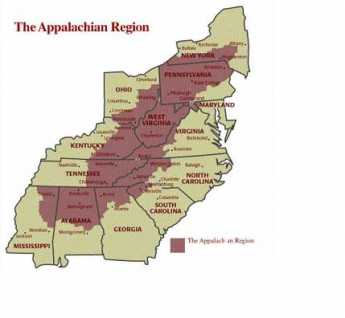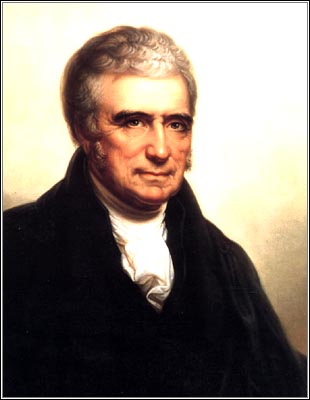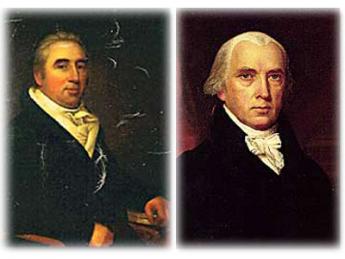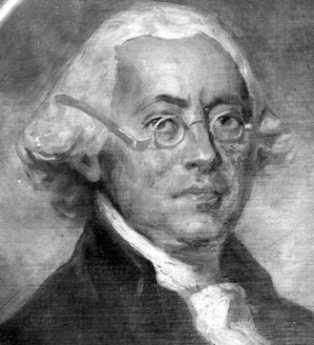Related Topics
...Ratification, Bill of Rights and Other Amendments
The 1787 Constitution lacked a Bill of Rights. Few except Madison himself were opposed to adding one, but many other delegates would have failed election without promising it. Negotiations at the Convention had proved so excitingly innovative that time ran out before the Convention had to adjourn with only a promise of a Bill of Rights, first thing.
Religious Philadelphia
William Penn wanted a colony with religious freedom. A considerable number, if not the majority, of American religious denominations were founded in this city. The main misconception about religious Philadelphia is that it is Quaker-dominated. But the broader misconception is that it is not Quaker-dominated.
Philadelphia Legal Scene
The American legal profession grew up in this town, creating institutions and traditions that set the style for everyone else. Boston, New York and Washington have lots of influential lawyers, but Philadelphia shapes the legal profession.
Academia in the Philadelphia Region
Higher education is a source of pride, progress, and aggravation.
Shaping the Constitution in Philadelphia
After Independence, the weakness of the Federal government dismayed a band of ardent patriots, so under Washington's leadership a stronger Constitution was written. Almost immediately, comrades discovered they had wanted the same thing for different reasons, so during the formative period they struggled to reshape future directions . Moving the Capitol from Philadelphia to the Potomac proved curiously central to all this.
On the Subject of Rights

|
| Scotch-Irish Presbyterians of Appalachia |
MOST Americans of the 18th century regarded themselves as members of some minority group. The constitutional Founding Fathers, mindful of Cromwell and the English Civil War, were concerned that majority rule might evolve into tyranny. They searched to protect minorities. Because everyone could imagine being outvoted on some dispute, minority status was a universal American concern about democracy. There was a particularly hot political center of Bill of Rights agitation among Scotch-Irish Presbyterians of Appalachia which persists after two centuries, consequently among Southerners and western Pennsylvanians. In those strongly religious days, it seemed self-evident minorities had "divine" rights, conferred by God, which legislatures must not violate, and legislatures repeatedly seemed to agree. As dissenting minorities later became increasingly secular, the language of rights shifted to "natural" rights, without changing much else. Created by the purely logical analysis of the Enlightenment: a right was something anyone would willingly confer to others in order to preserve it for himself. In more contemporary language, the evolving demand is now for "human" rights, whose mystical authority grows from the intensity with which it is demanded. Although "Vox populi" sounds Roman, the concept of infallibility ("Vox Dei"), is an outgrowth of victory in the American Revolution. Underneath semantic wrestling, one essential is demanded: no government, whether by the king or elected majority, may overrule it. The unthreatened majority easily wearies of such agitation and remains more pragmatically concerned with efficiency, peace, and prosperity. Our two political parties began with Bill of Rights outcry, one party appalled by the French Revolution, the other applauding its feisty spirit.
 A little rebellion now and then is a good thing . . . .It is a medicine necessary for the sound health of government... God forbid we should ever be twenty years without such a rebellion. The people cannot be all, and always, well informed. The part which is wrong will be discontented, in proportion to the importance of the facts they misconceive. If they remain quiet under such misconceptions, it is lethargy, the forerunner of death to the public liberty . . . . and what country can preserve its liberties, if its rulers are not warned, from time to time, that these people preserve the spirit of resistance? Let them take arms. The remedy is to set them right as to the facts, pardon and pacify them. What signify a few lives lost in a century or two? The tree of liberty must be refreshed, from time to time, with the blood of patriots and tyrants. It is its natural manure. 
|
| Thomas Jefferson, 1787 |
The founders of the American republic arrived at a compromise formula: strengthen majority-rule government to a point where it can be effective, but keep government too weak to tyrannize a minority. This Constitutional effort first grew out of a general perception that the Articles of Confederation were too weak to be effective, so the new federal government must be able to control the states in a small number of specified areas. But having achieved that, a reverse concern immediately arose. Since slaves and poor people would probably always outnumber rich ones, how can a democracy be prevented from freeing slaves, or poor people from voting themselves the property of rich ones? This concern was surely heightened by earlier maneuvering by two Virginians. Madison and Washington pressed to have Convention delegates be made up of prominent people, preferably former officers of the Continental Army. Their plan to ensure ratification was for legislatures to make way before a Convention of celebrities. It probably did not occur to the two Virginia plantation owners that this selection process might seem to be purely motivated to ensure the best interests of rich people. Rich people usually have power, regardless of not having a majority. Except for perhaps Gouverneur Morris, Convention delegates, however, were not aristocrats but self-made men, and with few exceptions successful ones. It remains hard to argue with their instinctive reaction that if laws make it impossible for those who have been successful in the past to become a self-made success, then it is impossible to see anyone achieving success. Eighty years subsequently the slave component of this issue was finally settled, but sectional bitterness took its place.

|
| Chief Justice, John Marshall |
The Constitutional Convention weakened the new government to avoid its misuse by a popular majority. They designed separation of its powers, perhaps hoping a balance of power would develop among the Legislative, Executive and Judicial branches, each selected in different ways. As the matter was finally ratified, it seemed a little inadequate. James Madison, in particular, rebelled against the final step of giving the Supreme Court the power to review for constitutionality the laws passed by Congress and signed by the President. It remained for the fourth Chief Justice, John Marshall, to assert judicial review in 1803, sixteen years after the Constitutional Convention. Perhaps with an eye toward symbolism, he did so in a case called Marbury v. Madison.

|
| Marbury v. Madison |
This case, strengthened and amplified by later cases with the same outcome, was to enshrine the Constitution as the capstone of the enforcement system of the United States, with all lesser laws consistent with constitutional powers enumerated -- powers implied, and powers are forbidden. This capstone structure, rather than American provincialism so noticed by Europeans, explains why American law has drifted from common law to statutory law, while references in Supreme Court opinions to viewpoints in foreign law are greeted with derision. Foreigners are not given a vote in our system, and our system is grimly determined to recirculate the opinions of its own citizens through the system, especially through the choke-point of the Constitution. In biochemical terms, the Constitution is the rate-limiting factor. It is far too late to try to make it easier to amend the Constitution, just as it is surely too late to eliminate the Electoral College for selecting the President. Too many balance-wheels have been hooked to these fundamentals. Blame it on interest groups if you please, but seriously disturbing these fundamentals will prove unsettling enough to undermine any interest groups that assail them.

|
| James Wilson of Pennsylvania |
With the blocking of other avenues to constrain majority rule, the system has possibly provided a new one, which may someday be named after James Wilson of Pennsylvania. Wilson lived at the corner of 3rd and Walnut, making it convenient to sign both the Declaration of Independence and the Constitution. Although he spoke 168 times at the Constitutional Convention, his name is most often associated with the idea that basic legal principles should be part of the general background of all educated citizens. Sometimes referred to as the founding professor of the first law school, the University of Pennsylvania, Wilson recognized that the actual practice of the law soon drifts from legal principles to settling on legal mechanics. Law students eventually come to learn that what matters most is what a judge recently handed down as an important opinion setting a new precedent. Step by step the law moves from principles to precedents, and from early precedents to recent precedents. The system is said to be a higher variant on the scientific method -- hypothesis, tests of the hypothesis, modified hypothesis and then tests of the modified version -- first created by Sir Francis Bacon. The law, in short, drifts away from Original Intent but does so proudly, denying a subversion of original principles but asserting a reasoned response to actual experience. Perhaps, in this enlightening process, new human rights can be discovered. Such as a right to abortion based on a right to privacy, based on something else you will have to read the original opinion to recall. It is not necessary to be a fundamentalist Christian to be alarmed by this process when it travels so far from the choke point of the Constitution, overturning dozens of state laws as it goes. Perhaps the most serious criticism of Roe v. Wade is that only two alternatives exist for those who wish to modify it: either undermine the Supreme Court by packing it with supporters of change or else amend the Constitution, which would be nearly impossible to do. Entirely too many plain non-lawyers who have no objection to abortion have read the Constitution and are now mistrustful. Mistrustful of the reasonings of Justice Blackmun, of the profession which acquiesced to his action, and of the intellectual migration process being defended. Whether they know it or not, they are followers of James Wilson, of 3rd and Walnut, Philadelphia.

|
| Jennifer Nedelsky |
Jennifer Nedelsky is a Canadian lawyer who has been active in promoting an alternative to our system of using a constitutional right as a legal "trump card for displeasing laws.", as well as the failed European attempt to invent dozens of new human rights as a way of limiting government power. In Canadian law, a feature is called the "time-limited notwithstanding clause." The legislative branch in Canada is permitted to pass laws which violate a constitutional right, "notwithstanding that right for five years". It is possible to understand the appeal of this legal safety valve, to wait out the popular appeal of a mere fad, or to provide emergency relief in the face of unexpected circumstances. Some of the enduring problems with the legislation passed during the Roosevelt court-packing era might have been more generally acceptable with this clause attached. And it might even address the temptation recently embraced by Rahn Emanuel, that no crisis should ever be wasted. It is true that some appalling legislation does occasionally turn out to be useful. More often, however, it is a well-intended and highly acclaimed law which turns out to create a muddle.
Ultimately, however, we are likely to fall back on the comfort that our Constitution more or less as originally created, has lasted over two hundred years while no other constitution can match that claim. Others have their proposed systems but we have our proven one.
Originally published: Monday, December 29, 2008; most-recently modified: Wednesday, May 29, 2019
| Posted by: Bill Walker | Dec 30, 2008 9:29 PM |
Fortunately, the Founders left an alternative in place in the Constitution to deal with this should the government fail to address our needs. The Article V Convention.
To date, all 50 states have submitted over 650 applications for an Article V Convention. The Constitution requires the states submit 34 applications in order to compel Congress to call a convention.
You can read the texts of the applications and learn a great deal more about an Article V Convention at www.foavc.org. Please, take the time to learn about this important part of the Constitution. Thank you.